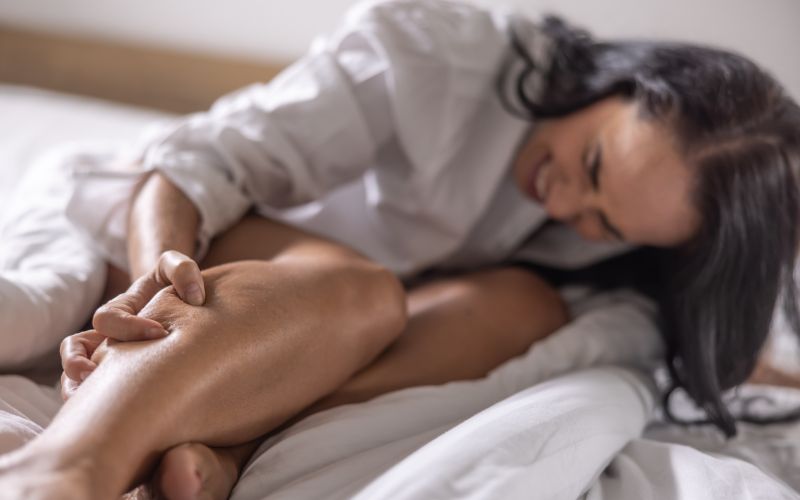
Leg Pain at Night: Causes, Relief Tips, and Treatment
Leg pain is a common complaint for many people in their sleep. It might be an occasional nuisance for some but a complete nuisance in the lives of others and interferes with rest and recovery. Leg pain can be merely slight aches, a definite source of discomfort, or even associated with various causes. Knowing what may be causing a nighttime buildup of pain in the legs and how to care for them can make a difference in your sleep quality and overall health.
Common Causes Of Nighttime Leg Pain
There are several reasons for pains in the legs that occur at night. Most of them are minor, but some could indicate more severe complications. Here's a general list of some of the more common causes:
1. Muscle Cramps (Nocturnal Leg Cramps)
Muscle cramps, also known as "Charley horses," are one of the most frequent causes of nocturnal leg pain. They occur as sudden, involuntary muscle contractions that occur without warning, usually in the calf or foot, and can be extremely painful for a few seconds to several minutes.
The cause of muscle cramps may be:
- Dehydration
- Electrolyte imbalances, such as low levels of potassium, calcium, or magnesium
- Overuse of muscles
- Lack of blood circulation
- Prolonged or awkward sleeping position
Stretching before bedtime and ensuring that the muscles are well-lubricated can help prevent nocturnal leg cramping.
2. Restless Leg Syndrome
Another very common cause of leg discomfort during the night is Restless Leg Syndrome. This is a neurological disorder in which an individual experiences an irresistible urge to move one's legs, usually accompanied by discomfort sensations such as tingling, itching, and creeping up the legs. It normally worsens in the evening or at any time of inactivity, thus making it hard to fall asleep.
While the cause of RLS is often unknown, it is related to:
- Low iron
- Chronic diseases like diabetes or kidney disease
- Some medications, such as antihistamines or antidepressants
- Pregnancy
The treatment of RLS is primarily nonspecific and focused on managing the disease(s) and lifestyle accommodations that will prevent future flare-ups; these include regular exercise, a regular sleep schedule, and the avoidance of stimulants, including caffeine/alcohol use within hours of sleep.
3. Peripheral Artery Disease (PAD)
Peripheral Artery Disease (PAD) is a disorder in which the blood vessels, the arteries that transport blood to the lower limbs, may develop atherosclerosisor blockage, reducing the ability to carry blood through these vessels. This causes leg pain, which worsens during periods of rest and at night because the decrease in blood fluxing through the muscles is enhanced. Intermittent claudication is painful cramping of the calf area that occurs in patients with PAD after walking or any form of physical exercise and can also take place at night.
Risk factors for PAD include:
- Smoking
- Hypertension
- Hypercholesterolemia
- Diabetes
If you have been experiencing nighttime leg pain, consult your doctor and seek evaluation and appropriate treatment. If left unaddressed, PAD could lead to severe complications, such as wounds that would not heal, and a heightened risk for myocardial infarction or stroke.
4. Varicose Veins
Varicose veins are twisted, enlarged veins in the subcutaneous layer commonly found in the legs. The two main causes of varicose veins are defective valves and damaged veins. The result of storing blood pools is swelling and pain. Though varicose veins can cause pain and a feeling of heaviness and aching during the day, they usually worsen at night following prolonged periods of sitting or standing.
Other symptoms of varicose veins are:
- Swelling on the legs or ankles
- Tingling and aching, throbbing, and burning sensation
- Restless legs
Raising your legs, wearing compression stockings, or minimizing sitting and standing for long periods may help with varicose vein symptoms. At times, medical interventions such as sclerotherapy or laser treatment are required.
5. Neuralgia, Neuropathy
Nerve pain, or neuropathy, is just another possible cause of night pain in the legs. Neuropathy is damage to or irritation of the nerves in a leg, causing burning, prickling, tingling, or sharp pains that shoot. Diabetic neuropathy is very common and can cause night pain due to a change in blood glucose at night, irritating the nerves.
Other causes of neuropathy are:
- Alcoholism
- Infections
- Autoimmune diseases
- Exposure to toxins
Treatment for neuropathy generally focuses on controlling symptoms and improving the underlying disorder through the use of medications, lifestyle changes, and physical therapy.
How To Minimize And Alleviate Night Pain In Legs
If you experience leg pain at night, the good news is that you can do several things to minimize the pain and improve your sleep quality.
1. Stretching and Light Exercise
Regular stretching and light physical activities can help keep your muscles flexible enough to lower the chances of cramping or stiffness at night. For muscular cramps, stretch the muscles in your calves, hamstrings, and quadriceps before bed. Yoga or a light walk can also facilitate overall circulation, lowering the risk of cramps or discomfort.

2. Hydrate
Dehydration is one of the most common causes of muscle cramps, so drink enough water all day. However, do not try to drink too much fluid at night because this can interfere with your sleep.
3. Heat and Cold Therapy
Apply heat or cold to the afflicted area. Either heat or cold may ease muscle cramps and nerve pains. A warm bath before bedtime is often used to relax tight muscles, while an ice pack applied to the affected region can numb the pain and reduce swelling.
4. Over-the-Counter Pain Relief
Mildly to moderately painful legs may find soothing relief in over-the-counter pain relievers like acetaminophen or ibuprofen. Consider using Vital Earth's Calcium, Magnesium, & Liquid to support your muscles with essential minerals. This supplement helps restore necessary minerals drawn from the body, such as magnesium, which directly relates to cramp prevention and the functioning of the muscles.
Magnesium relaxes muscles, thus preventing the occurrence and severity of nocturnal leg cramps. Calcium, combined with magnesium, maintains proper nerve impulses and muscle contraction. By supplementing with a high-grade supplement like Vital Earth's CML and over-the-counter prescription medication as needed, one can approach the underlying causes of discomfort on a natural, holistic basis.

5. Compression Stockings
Sometimes, people wear compression stockings daily to enhance circulation and ease some of the discomfort of varicose veins and many other vascular conditions. Be sure to choose the correct size and compression, or consult a healthcare provider if you need more clarification.
6. Improve Your Sleep Hygiene
Good sleep hygiene is essential for anyone who suffers from nighttime discomfort. Set up a regular sleep schedule and a relaxing activity for bedtime, and your sleeping environment should be conducive to sleep. Avoid stimulants before bedtime, like caffeine or alcohol. White noise machines or other soothing sounds can also help with relaxation.
Conclusion
Leg pain at night is a very painful and frustrating condition that will disturb your sleep pattern and even your quality of life. Regardless of the cause there are things you can do to try and alleviate discomfort and manage your symptoms. Still, if your symptoms linger or worsen, don't hesitate to seek a professional opinion to make sure you are not dealing with the cause of your pain.
Frequently Asked Questions
Can Leg Pain Be An Indication Of Underlying Disease?
If you are experiencing leg pain, consider a differential diagnosis. Possible causes include PAD, DVT, sciatica, RLS, and osteoarthritis. The extent of your treatment will depend on the cause of your leg pain; it may be only lifestyle changes and medications, or it could be more extreme, including surgery.
How Do I Stop My Legs from Hurting?
Stretching exercises won't prevent aches in your legs, but hydration tips will ensure you drink enough water during the day. You can also modify how you sleep to support other areas of your body. These will increase comfort and reduce distress caused by sleep posture.
Why do adults often experience leg pain at night?
Leg pain at night can come from several health conditions, such as joint inflammation, peripheral neuropathy, muscle spasms, or fatigue from daily movement. In addition, issues like thyroid imbalance, Parkinson’s disease, or kidney failure may play a role. Adults with a history of blood clots, liver problems, or valve damage should request tests and book appointments with a specialist to rule out serious conditions.
What signs show that leg pain at night needs professional care?
Seek medical help if pain persists despite home massage and treatments, particularly if it’s linked with swelling, unusual sensations in the feet, or skin issues around the joints. Conditions such as peripheral neuropathy, thyroid problems, blood clots, or kidney failure can cause serious damage if ignored.
